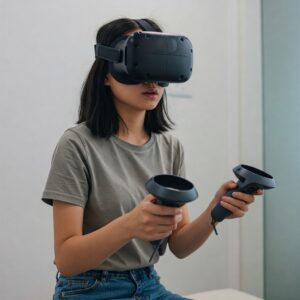Virtual Reality: Stepping Into the Next 5 Years – Beyond the Headset
Remember those clunky, early VR headsets? The ones that promised so much, but often delivered motion sickness and pixelated worlds? Well, forget those. Today, VR is shedding its experimental skin, evolving into a technology poised to reshape how we live, work, and learn. Over the next five years, we’re not just talking about gaming anymore; we’re talking about a fundamental shift in how we experience reality.
Beyond the Headset: A Deeper Dive
Imagine stepping into ancient Rome, the heat of the sun on your skin, the roar of the crowd filling your ears. Or perhaps dissecting a virtual frog, feeling the subtle give of its skin beneath your gloved fingers. This isn’t science fiction; it’s the reality of VR education in the near future.

Education will be revolutionized. Students will explore complex concepts in interactive, immersive environments, making learning more engaging and effective. Imagine remote field trips to the bottom of the ocean or the surface of Mars!
Healthcare will also see a significant transformation. VR will become a powerful tool for pain management, helping patients escape the discomfort of procedures. It will revolutionize rehabilitation, allowing patients to practice physical therapy in engaging virtual environments. And let’s not forget the potential for mental health therapies, where VR can help individuals overcome phobias and PTSD in a controlled and supportive setting.
The workplace will also be transformed. Say goodbye to static video conferences and hello to immersive virtual offices where colleagues can collaborate naturally, regardless of their physical location. Imagine training for hazardous tasks like firefighting or aircraft maintenance in a safe, simulated environment. VR will streamline product design and development, allowing teams to prototype and test ideas in a virtual space before ever setting foot in a physical workshop.
Navigating the Shadows: Potential Challenges
Of course, this isn’t all sunshine and rainbows. As with any powerful technology, VR presents its own set of challenges.
The risk of addiction is a real concern. As VR experiences become more compelling, the temptation to escape into these digital worlds could become overwhelming. We need to be mindful of this potential and develop strategies to promote healthy VR usage.
Social isolation is another potential pitfall. While VR can facilitate new forms of connection, it’s crucial to ensure that it doesn’t replace meaningful human interaction. We need to find a balance between virtual experiences and real-world connections.
And let’s not forget the digital divide. Access to cutting-edge VR technology will not be equal for everyone. We must work to ensure that everyone has the opportunity to benefit from these advancements.
The Future Unveiled: A Convergence of Realities
The next five years will witness a convergence of VR, Augmented Reality (AR), and Mixed Reality (MR).
Imagine wearing smart glasses that overlay digital information onto the real world, providing real-time navigation, product information, and even interactive games. This is the power of AR.
MR will blur the lines between the virtual and real worlds even further. Imagine interacting with virtual objects in your physical workspace, or performing complex surgeries with the assistance of augmented reality overlays.
And then there’s the metaverse, a persistent, shared virtual world where users can interact, work, and play. VR will be a cornerstone of this exciting new frontier, offering immersive experiences that go beyond anything we can currently imagine.
A Responsible Future
VR, MR, and AR hold immense potential to enhance our lives, but we must proceed with caution. By addressing the potential risks and promoting responsible development, we can ensure that these technologies are used for the betterment of humanity.
The next five years will be a crucial period in the evolution of these technologies. It’s up to us to shape their trajectory, ensuring that they empower us to learn, connect, and thrive in a world that is increasingly intertwined with the virtual.
What do you think? Are you excited about the future of VR? What are your concerns? Share your thoughts in the comments below!
